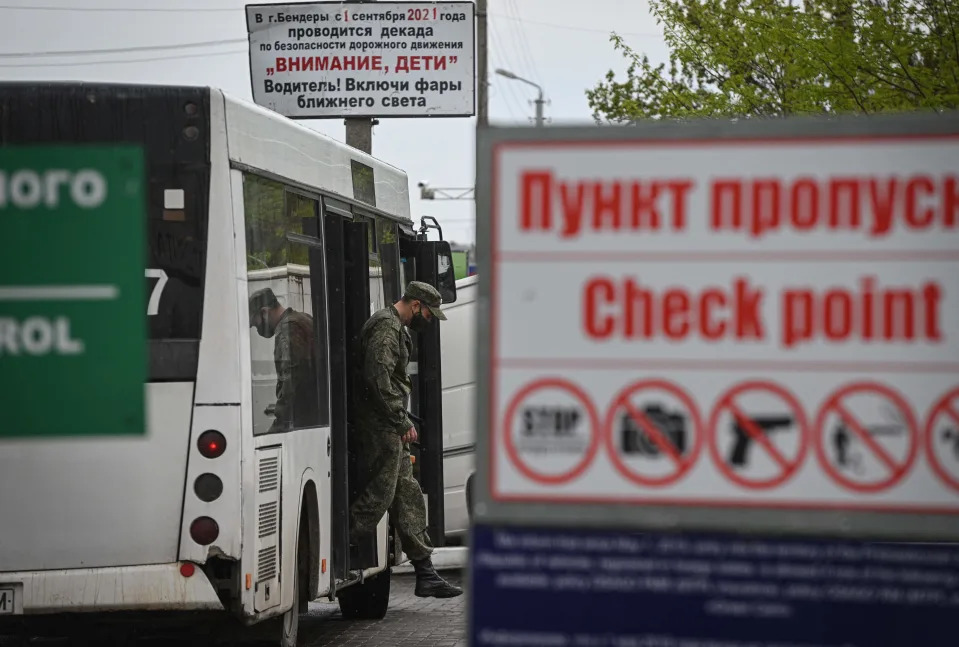Yahoo! News
Russia-Ukraine war latest: Former NATO commander warns that West must gear up for war
Niamh Cavanagh, Producer – April 28, 2022
LONDON — As Russia’s invasion of Ukraine hits its 64th day, a former NATO commander urged the West to prepare for a “worst case” scenario: war with Russia. Meanwhile, U.N. Secretary-General António Guterres on Thursday visited areas around Kyiv that were formerly held by Russian forces. “The war is evil,” he said while standing beside destroyed apartment blocks in the town of Borodyanka.
‘Worst case is war with Russia’
In response to comments made by the U.K. foreign secretary over the West’s needing to “double down” on its support for Ukraine, former NATO commander Richard Shirreff told BBC Radio 4’s “Today” program it was “absolutely the right approach” and that “it’s got to be followed through with significant resources, and it’s got to be done right across the alliance as a whole.”
Shirreff, formerly a NATO deputy strategic commander for Europe, went on to caution that the Kremlin is likely to respond to this aggressively and that the West should be prepared for a worst-case scenario. “The worst case is war with Russia,” he said. “By gearing itself up for the worst case, it is most likely to deter [Russian President Vladimir] Putin because ultimately Putin respects strength.”
U.N. chief visits Ukraine
Standing outside burned-out apartment blocks in Borodyanka on Thursday, Guterres said: “When I see those destroyed buildings … I imagine my family in one of those houses that is now destroyed and black. I see my granddaughters running away in panic.” He added: “The war is an absurdity in the 21st century. The war is evil. And when you see these situations, our heart of course stays with the victims, our condolences to their families. But our emotions are … there is no way a war can be acceptable in the 21st century.”
Later in the morning, Guterres visited the site of a mass grave in Bucha, telling reporters he fully supports the International Criminal Court’s investigation of Russia’s alleged war crimes. “When we see this horrendous site, it makes me feel how important it is [to have] a thorough investigation and accountability,” he said. “But when we talk of war crimes, we cannot forget that the worst of crimes is war itself.”
Alleged war crimes being probed
Thousands of alleged war crimes committed by Russian troops are under investigation by the Ukrainian prosecutor general’s office. A total of 8,653 crimes have been registered with the office, and 620 suspects have been accused of the aggression, the office revealed on Thursday. The office also reported that 217 children have been killed and 393 others have been injured during the war.
Russia is blackmailing Europe with energy, says Zelensky
Ukrainian President Volodymyr Zelensky accused Russia of engaging in “energy blackmail” against Europe after Moscow halted natural gas deliveries to Poland and Bulgaria. In his nightly address to the nation on Wednesday, Zelensky said the Kremlin considers not only energy but trade as weapons to use against European countries.
“[Russia] is just waiting for the moment when one or another trade area can be used to blackmail Europeans politically, or to strengthen Russia’s military machine, which sees a united Europe as a target,” he said. “Hence, the sooner everyone in Europe admits that it is inadmissible to depend on Russia in trade, the sooner it will be possible to guarantee stability in European markets.”
Europe relies on Moscow for more than a third of its gas needs, and Russian state energy company Gazprom holds a monopoly on the pipeline supplies.





